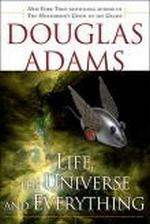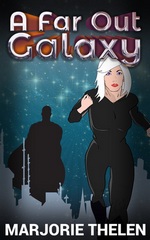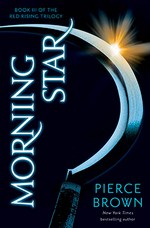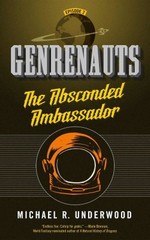by Pierce Brown
Series: Red Rising, #3Hardcover, 518 pg.
Del Rey, 2016
Read: February 24 – March 3, 2016

“There is no pain. Only joy,” they chant, deep in the embrace of the god’s bread. Sefi begins the war bellow. Her voice higher than Ragnar’s. Her two wing-sisters join her. Then their wing-sisters, until dozens fill the com with their song, giving me a sense of grandeur as my mind tells my body to flee. This is why the Obsidians chant. Not to sow terror. But to feel brave, to feel kinship, instead of isolation and fear.
Sweat drips down my spine.
Fear is not real.
Holiday deactivates her safety.
“Njar la tagag . . . ”
My razor goes rigid.
PulseWeapon shudders and whines, priming.
Body trembles. Mouth full of ashes. Wear the mask. Hide the man. Feel nothing. See everything. Move and kill. Move and kill. I am not a man. They are not men.
The chanting swells. . . “Syn tir rjyka!”
Fear is not real.
If you’re watching, Eo, it’s time to close your eyes.
The Reaper has come. And he’s brought hell with him.
And when The Reaper, Darrow of Lykos, says he’s brought hell with him, you’d best believe it.
With books that come later in a series — especially with the last volume — there are huge expectations and hopes. Sometimes the book’s a disappointment; sometimes it’s as good as you hoped — every now and then, it’s better than you’d hoped. And then there are the times you get something like Morning Star. I want to avoid hyperbole, and I don’t want to over-sell, so let me just say that Pierce Brown delivered. I’m not sure how to talk about this book — one of my most anticipated reads of 2016 — other than to say it did not disappoint in the slightest, and if it doesn’t find its way to my favorite reads of 2016, I’d be flummoxed (although that would mean we have an unbelievably good 9 months ahead).
We pick up about a year after Golden Son — well, that’s not true. We start off with one of those aggravating teases for events later in the book before starting the actual story. If I’m going to complain about it in Freedom’s Child a couple of weeks ago, I’d better complain about it here. Thankfully, it’s a brief tease and you can forget it quickly because Chapter 1 doesn’t wait too long to get to the brutality that this series is so capable of bringing, making you forget about trivial things like bad ways to start a novel. I’m not going to get into the plot — if you’re curious, start with Red Rising and catch up. If you’ve read one or two of these books, I just want to assure you that you should grab this.
Red Rising was like the love child of Ender’s Game and The Hunger Games hopped up on amphetamines, steroids and too much Red Bull. Golden Sun was a roller coaster of stomach-lurching twists and turns and shattered hopes. Morning Star has elements of both, but it also reads like a series of climatic scenes from epic novels and movies stacked on top of one another — Jackson’s The Lord of The Rings + Gladiator + The Patriot + a few more things like that on the day that Michael settles all family business. Somehow, Brown keeps the tension mounting from chapter to chapter, in a way that every battle, every encounter feels like it could be the novel’s climax. Yet when the actual climax happens you’re not prepared.
Having been trained by Golden Son, I spent a lot of time expecting a betrayal, waiting for the sucker punch I knew was coming. But it wasn’t that kind of book* — it was a book of hard choices — even compromises (the good kind) — of people doing the right thing, to the best of their understanding. Not always the best for themselves, but the best for their principles, their loved ones, their people. Family — biological family, extended family, found family — is a major theme throughout. It shouldn’t be surprising considering that this all started with a husband and wife, but when you think of The Red Rising Trilogy, family isn’t one of the first words that come to mind. Well, after you read this, it might be.
Lieutenant Commander Worf, son of Mogh, would’ve approved of so much of the action here (on both sides). The pages dripped with honor and nobility (in both classic and more modern understandings of the concepts). Despite it being a mainstay in fiction, I have a hard time buying the concept of noble deaths, but man . . . there’s one roughly midway through the that got me in just the right way. The dying was a little more protracted than Brown’s typical practice, giving him time to do more with it narratively. It was such a good piece of writing (even if all the individual elements in the scene were cliché), it’s one of the most effective parts of the series. Once it starts, you know what’s happening, you know how the effects of it will play out, but it still works. It’s like the da da da dummm at the beginning of the 5th — everyone knows it, but if an orchestra does it right? It’s powerful stuff.
Like a good general — Brown’s always a few steps ahead of the reader, well, me. As before, he surprised me all the time. There were a couple of times that I came close to seeing his play — technically — but his actual move was so much better than I’d guessed, I might as well have been moving checkers around his chess board.
Before I came across the section I quoted in my opening, I was going to use:
Now I remember hate.
I’m glad I didn’t. Morning Star isn’t about that. After Golden Son (or after Eo’s death), that’s what you expect: Darrow going all John Wick/Beatrix Kiddo/Frank Castle, but that’s not what the book is. Darrow is much more than a vengeance-machine. He’s more than rage, more than hatred — he’s full of both, no mistake. But that’s not all that’s driving him.
And because there’s more to him, the book — the series — is elevated to something beyond a great SF/Action romp. When Darrow, his friends and/or his army say something, do something to send a message, more often than not, it’s inspiring, at the very least, stirring. In the end, Darrow’s mission isn’t about destroying the Golds (although there is plenty of destruction), it’s something more.
The question is, can he fulfill this mission? What would that look like? It is so close to the final page when you get the actual answers to those (and all the other) questions you have.
Oh yeah, and Brown made me laugh out loud once. There were heartwarming moments, moments of joy, moments of awe. In the midst of the chaos, the violence, the destruction, and all the blood? Rays of humanity everywhere.
Simply put, this is the perfect conclusion for this fantastic series. I can’t think of a more fitting way for Brown to have concluded things. If you liked Red Rising and Golden Son, you’ll love this.
—
* Which isn’t to say that there aren’t gut punches.
—–

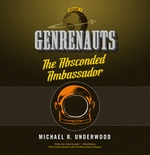 The Absconded Ambassador
The Absconded Ambassador I really don’t have much more to say about the audiobook that I didn’t say about the original, but I wanted to get something up — so if this seems largely familiar, it is. But not entirely …
I really don’t have much more to say about the audiobook that I didn’t say about the original, but I wanted to get something up — so if this seems largely familiar, it is. But not entirely …




